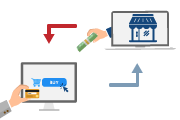Filing a chargeback for a payment made with a Brazilian card is extremely simple. The cardholder just needs to call the card issuing bank and inform them of the reason for requesting a chargeback. However, this convenience generates controversy. On one hand, such a mechanism protects online buyers from improper charges. On the other, it is enough for the cardholder to claim that the purchase is not recognized, which leaves the merchant exposed to friendly fraud. For this reason, controlling chargeback rates is of great concern to online merchants. In the face of this problem, insurance services against chargebacks have arisen as a seemingly perfect solution. However, completely eliminating risks and guaranteeing 0% of chargebacks has a price and it can become an inconvenience for businesses.
What is Insurance Against Chargebacks?
Normally, a chargeback request generates different types of loss for the online store. First of all, if the product or service has already been delivered, there is no way to recover it. In these cases, in addition to not receiving the money for the goods delivered, the merchant will have to cover the fee for the payment processing and an extra charge imposed by acquirers and payment processors as a penalty for the chargeback. Additionally, if the percentage of chargebacks over the total transactions exceeds an established level, an additional charge can be generated.
Insurance against chargebacks is a service hired to totally protect the merchant in this situation. It consists of a system that analyses the transactions and, therefore, applies a filter prior to the payment acceptance. The hired insurance service offers a guarantee that covers 100% of the merchants’ losses if a fraudulent transaction is approved.
Why does this Negatively Affect Conversions?
The chargeback insurance offers a total guarantee, and therefore the merchant does not have to cover the previously mentioned costs. However, this means that the insurance company is assuming the risk and, therefore, will try to take on the lowest possible risk.
In order to offer such a guarantee, the company providing the insurance against chargeback will filter transactions massively. This means that the system will block many payments that could have been converted into sales. In addition to reducing the risk, such a filter can also generate a drastic conversion rates’ decrease for the online shop, as many real transactions end up being identified as a possible fraud attempt.
According to Konduto data, the average of fraud attempts in Brazilian e-commerce is 3.58%. However, online shops using a total protection system against chargebacks might see a decline rate of up to 15% of the transactions. Despite the security of hiring insurance, the final result in the company’s revenue can end up being negative and the use of the service becomes counterproductive.
In any case, keeping chargeback rates in control is still a priority for any online business. Therefore, there are a series of measures that the merchant can take preventively. PagBrasil offers PagShield, an antifraud service that automatically identifies fraudulent transactions and reduces false positives, in addition to allowing the pre-authorisation of the payment so that the merchant can verify the client’s data before approving the sale.



